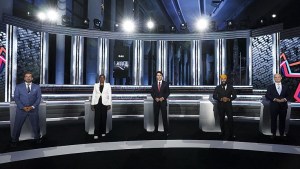Party Leaders All Promote Racist, Mythical Foreign Policy

All Global Research articles can be read in 51 languages by activating the “Translate Website” drop down menu on the top banner of our home page (Desktop version).
Visit and follow us on Instagram at @crg_globalresearch.
***
At the English language election debate Conservative leader Erin O’Toole claimed Canada “led the fight against apartheid” in South Africa. The absurd statement has gone largely uncontested, reflecting a racist, mythologized, view of Canada’s place in the world.
Does anyone believe that Canada was a stronger opponent of White minority rule in South Africa than Ghana? Angola? Tanzania? Kenya? Nigeria? Senegal? Sudan? Jamaica? India? Cuba? How about dozens of other mostly “black” and “brown” nations? Or, for that matter, the “white” Communist bloc?
African countries began calling for the isolation of and sanctions against apartheid South Africa in the late 1950s, with many ordinary Canadians adding their voice to these calls through the 1960s, ’70s and early ’80s.
Ottawa maintained a trade agreement with South Africa between 1932 and 1979. As late as 1978 Canadian weapons were sold to South Africa and Ottawa supported a highly controversial IMF loan to the apartheid regime in 1982. Canada’s ties to apartheid are well documented in The Ambiguous Champion: Canada and South Africa in the Trudeau and Mulroney years, Canada Accomplice in Apartheid: Canadian Government and Corporate Involvement in South Africa, Canadian Relations with South Africa: A Diplomatic History and Trafficking in Apartheid: The Case for Canadian Sanctions.
It was only after decades of Canadian support for apartheid that the Mulroney government responded to domestic and international solidarity movements by adopting (partial) economic sanctions against South Africa in 1986. From October 1986 to September 1993, the period in which economic sanctions were in effect, Canada’s two-way trade with South Africa totaled $1.6 billion – 44 percent of the comparable period before sanctions. Ottawa never cut off diplomatic relations as did Norway, Denmark, New Zealand, Brazil, Argentina, and many other countries. To the extent the federal government deserves praise is that it took a more principled position towards the apartheid regime than erstwhile allies London, Israel and Washington. Or, to put it truthfully, Canada was the best of a bad lot.
O’Toole’s statement is not simply historically inaccurate. It’s racist as it erases predominately Black countries’ opposition to white minority rule in South Africa. O’Toole’s comment is only plausible if one adheres to a deeply Anglo-American worldview, which dominates Canadian political culture.
Tellingly, none of the party leaders contested O’Toole’s outlandish statement during or after the debate (they challenged other inaccurate comments). Nor did any media, from what I could tell, question O’Toole’s claim. Apparently, erasing Black and Brown countries leadership in the fight against South African apartheid is without political cost in Canada.
The non-reaction to O’Toole’s absurd comment also highlights foreign policy mythmaking among politicians. MPs basically never say anything critical of Canadian foreign policy history but often reference a supposed noble historical moment. As I previously pointed out, “it’s as if there’s a sign hanging in Parliament that says: ‘foreign policy mythologizers only’”.
O’Toole’s comment at the debate followed a discussion of Afghanistan that implied Canada’s disastrous 13-year war there was well-meaning. All the party leaders complained that more of those who supported us (the good guys) in Afghanistan weren’t helped out of the country. But none of the five party leaders raised questions about torture, airstrikes, nighttime assassination raids or those who pushed Canada to war. Nor was there any recognition that the Taliban’s victory reflected widespread dislike with the foreign occupation.
All four of the opposition party leaders (O’Toole, Annamie Paul, Yves-François Blanchet and Jagmeet Singh) swiftly transitioned from a non-debate on Afghanistan to criticizing the Liberals for not standing with the Muslim Uighur minority in western China. While the Organization of Islamic States and most majority Muslim nations have eschewed attacking China for mistreating the Uighurs, Washington has launched an international campaign to defend their rights. Yet the US has killed millions in majority Muslim Iraq, Libya, Somalia, Syria, Iran, Sudan, Pakistan, Yemen and Afghanistan over the past two decades. Similarly, thousands of Muslims were killed by Canadians in Afghanistan and Libya while Ottawa provides innumerable forms of support to Israel as it dispossesses or kills Muslims in its religious conquest. But Canadian politicians want us to focus on China’s mistreatment of Muslims!
In another sign of the opposition parties ‘target China’ ideology, the Conservatives and NDP criticized the Liberals for not being part of the new US, Britain and Australia (AUKUS) military partnership. AUKUS will deepen military ties between the world’s leading empire, former hegemon and its prototypical settler colonial outpost in a bid to contain China’s rise. Opposition politicians want Canada to be part of this latest effort to increase tensions with the world’s most populous country. But they ignore any impact these moves have on the international cooperation required to mitigate the existential threat posed by climate change.
When it comes to foreign policy Monday’s vote has little upside. A Conservative victory would probably make things worse but all the parties with a chance of winning seats in Parliament share a fundamentally racist, mythological view of Canada’s place in the world.
*
Note to readers: Please click the share buttons above or below. Follow us on Instagram, @crg_globalresearch. Forward this article to your email lists. Crosspost on your blog site, internet forums. etc.
Featured image is from the author

